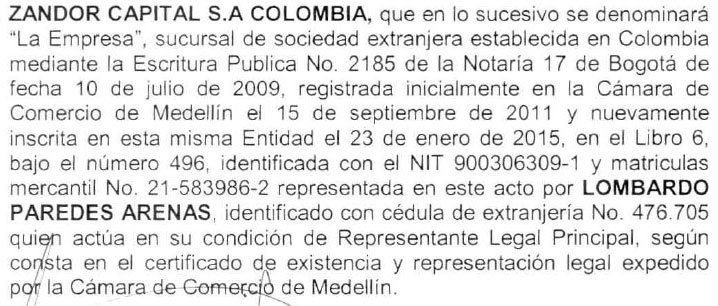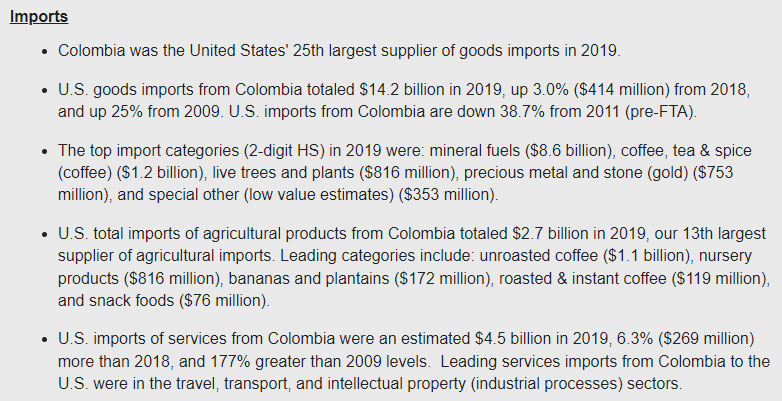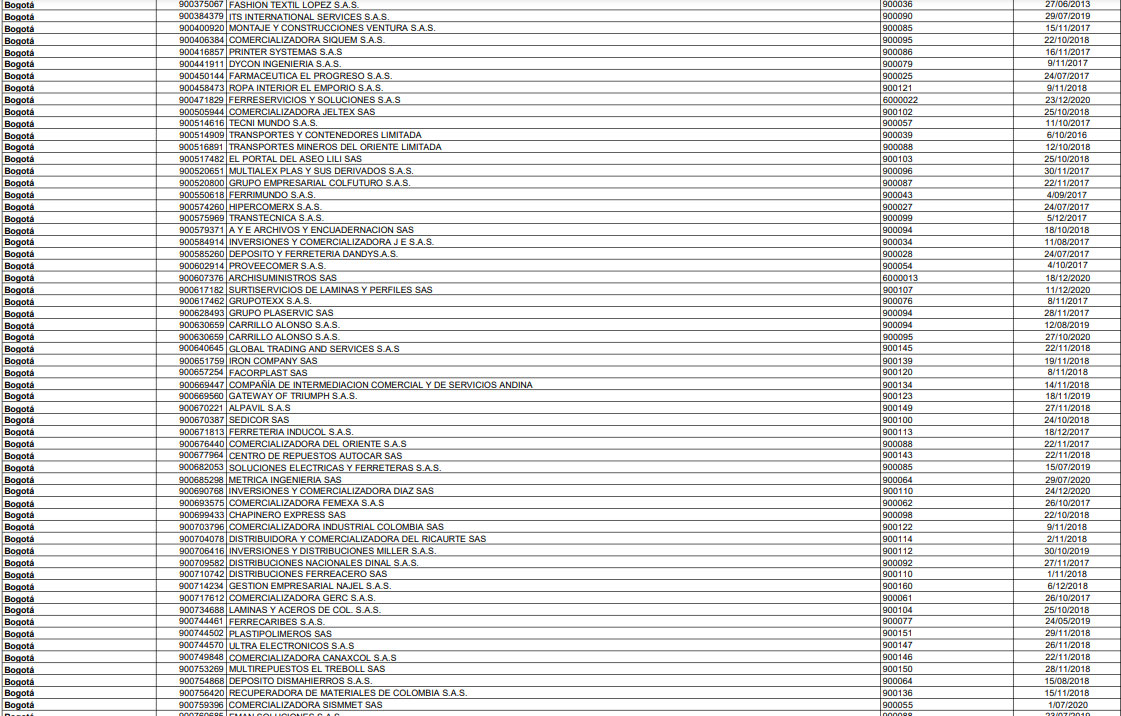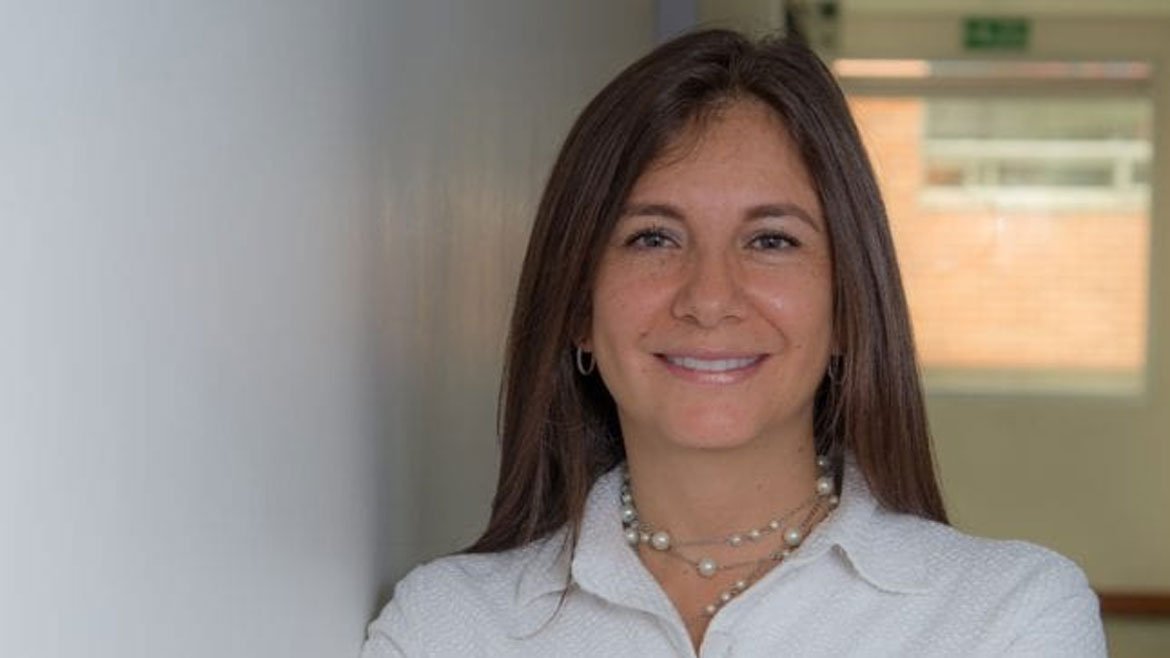US authorities have registered more than $30 billion in imports from Colombia over the past decade that don’t appear in the South American country’s export statistics.
The discrepancy in the trade partners’ statistics is the equivalent of more than 19% of the $157.9 billion in Colombian imported goods reported by the US Census Bureau (USCB) in the past decade.
The USCB doesn’t reported imported services, which implies that the discrepancy could be considerably bigger.
Discrepancy in reported trade
How to explain the discrepancy?
According to tax agency DIAN, Colombia’s total exports to the US were worth $127.5 billion between 2012 and 2021.
This is $30.4 billion less than the imported goods reported by the USCB in the same period.
According to the US Trade Representative (USTR), goods made up only 75% of American imports from Colombia in 2019.
Including services, American imports from Colombia had a total value of $18.7 billion, the USTR boasts on its website.
What doesn’t make sense is that Colombia’s total exports to the US in 2019 were worth a little more than $11.5 billion, according to the DIAN.
Gold and cocaine
Colombia’s tax agency said last month that its customs division had flagged more than 500 companies that were suspected of sending invoices for fictitious goods and services abroad since 2012.
A large number of the companies flagged by the DIAN were registered traders in precious metals like gold.
The list of the DIAN is similar to the so-called “kingpin list” of the US Treasury Department, which bans trade with 370 Colombian businesses suspected of money laundering or financing illegal armed groups.
The main difference is that the American list contains considerably less gold companies despite the fact that this metal “is becoming the most important source of financing for illegal armed groups, surpassing even cocaine trafficking,” according to the Department against Transnational Crime of the Organization of American States (OAS).
This confirms claims by Interpol and is supported by claims made by the Financial Crimes Enforcement Network (FinCen), which said in November last year that also oil extraction was financing illegal armed groups.
There is reporting that in conflict zones, environmental crimes, including illegal exploitation and theft of oil, provide an estimated 38% of illicit income to armed groups, more than any other illicit activity, including drug trafficking.
FinCen
The United Nations’ Office on Drugs and Crime said in June that in Colombia both illegal armed groups (GAO’s) and organized crime groups (GCO’s) were involved in the gold trade and money laundering.
This money laundering was made possible through, among other methods, the inflation of invoices of legal gold exports or invoices for fictitious exports, according to a 2021 report by the Global Financial Integrity, which analyzed gold exports between 2010 and 2018.
Colombia says that it sold $11.7 billion in gold, but the United States registers that it bought $13.9 billion. The $2.2 billion that doesn’t appear did not enter the Colombian economy but stayed in some financial hideout.
Global Financial Integrity investigator Mario Valencia
Furthermore, Colombia is exporting significantly more gold than it is mining, which indicates that illegally mined gold is added to legally mined gold somewhere in the supply chain, according to the OAS’ transnational crime agency.
In 2019, Colombia reported gold exports of approximately 10 tons over national gold production that year. In previous years, the discrepancy has been even more pronounced. This suggests the possible large-scale export of illegal gold and the practice of trade-based money laundering through misinvoicing of Colombia’s gold exports.
OAS’ Department against Transnational Crime
In any case, importers from the US and other countries are sending a lot more money to Colombia than their trade partners are actually exporting.
The reports by the UN and the OAS focused on the gold trade, which is particularly vulnerable, but money launderers can use any form of international trade for trade-based money laundering.
From dollars to pesos
The US Treasury Departments said in 2021 that it believed that Colombian transnational crime organizations (TCO’s) received an annual $10 billion for their cocaine sales in the US, mainly through “the Black Market Peso Exchange and trade-based money laundering” with their American associates.
The US’ Federal Bureau of Investigations (FBI) informed the US Congress in 2019 already that America’s legal economy had been infiltrated by money launderers who were also involved in the gold trade.
The US market plays a key role in the global exchange of precious metals. TCO’s use often-witting US businesses to exploit US regulations and export illegally extracted gold to the United States to launder billions of dollars of illicit proceeds from criminal operations in Latin America.
FBI assistant deputy director Regina Thompson
In fact the FBI said that the TCO’s involved in Colombia’s cocaine and gold exports are “threats to US national security and international human rights.” after the US’ Financial Crimes Enforcement Network (FinCen) claimed that global “proceeds from illegal mining are estimated by international organizations to be between $12 and $48 billion per year.”
The FBI stressed that the agency “remains dedicated to combating this threat” and was “committed to working with… governments in the region” that considered illegal mining “a significant priority.”
This is easier said that done as American “prosecutors must demonstrate that the underlying crime is a specified unlawful activity to obtain a money laundering conviction,” law enforcement officials told the US Congress’ Government Accountability Office last year.
The alleged involvement of legal mining companies in the illegal mining of gold additionally makes “its origin difficult to trace,” they added.
Front companies and notaries
Front companies like the ones flagged by the DIAN in Colombia, shell companies in offshore tax havens and the transfer of assets via notary offices further complicate the detection of money laundering rackets.
To illustrate, the main Colombian subsidiary of Canadian mining corporation Aris registered his company with a Bogota notary office in 2009 before registering with the Superintendent for Industry and Trade and the DIAN as the subsidiary of a Panamanian company with the same name.

Extract of contract indicating Aris Mining’s subsidiary Zandor Capital was founded in a notary office two years before it was formally registered at the Chamber of Commerce.
This construction allows shady investors to effectively own a company that is registered in the name of a frontman in Colombia.
A flurry of mergers with other mining companies with parents in offshore tax havens and subcontractors that operate their mines made Aris’ empire an opaque network of firms in Latin America and Africa.
The Canadian holding’s subsidiaries in Colombia have been accused of ties to crony capitalists and illegal armed groups for more than a decade.
Corruption
Another problems is the fact that many government officials are more interested in the profits of money laundering than national security, human rights or fighting crime.
The then-Inspector General of the US’ Department of Justice (DOJ), Michael Horowitz, found in July 2020 that the Drug Enforcement Administration (DEA) had been laundering tens of millions of dollars between 2015 and 2017.
Then-DEA Chief Compliance Officer Mary Schaefer assured that “significant progress has been made in recent years and that effort continues today” in a response.
In December 2021, however, a DEA agent was sentenced to 12 years in prison for laundering money with a “public official in Colombia” three months after one of his colleagues was sentenced to 13 years after lying to court over his alleged ties to drug traffickers.
When my client joined the DEA he was schooled in how to be corrupt, he was schooled in how to break the law.
Defense attorney of convicted DEA agent Jose Irizarry
In Colombia, investigations into money laundering associated with the drug trade and gold exports have also been hampered by corruption.
The prosecution’s Financial Crimes Chief, Luz Angela Bahamon, is facing multiple corruption charges, including one related to an illegal gold smuggling network.
A study released by Colombian financial risk analysis company Infolaft in July revealed that State entities were used to launder money in 21% of the investigated cases.
This infiltration of organized crime in government and the global trade has made enforcing the law when it comes to money laundering virtually impossible without shutting down global trade.






